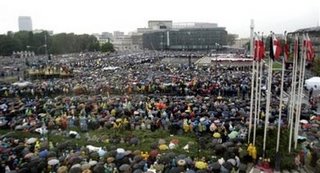What started out as scholarship with an openly feminist political agenda
has evolved into serious and respected inquiry. To understand this change,
consider what has happened to the field during the career of Bernadette Brooten.
As a graduate theology student at Harvard in the late 1970s, Brooten was told
that scholars already knew everything there was to know about women in the
Bible. Yet Brooten, now a professor of Christian studies at Brandeis University,
made the remarkable discovery by reading older versions of the Bible that
Junius, one of the many Christian “Apostles” mentioned by Saint Paul, was in
fact a woman, Junia, whose name was masculinized over the centuries by
translators with their own agenda. Brooten’s discovery became “official” when
Junia’s real name was incorporated into the New Standard Revised Version of the
Bible, which came out in 1989.
Now let me be the first to point out even if the "feminist" discovery is real, it really isn't that big of a deal, since Mary Magdalene has been called Apostle to the Apostles meaning that she was "sent" (the meaning of the word apostle) to those who were also commissioned to be sent. But of course as I'm sure we'll here this relative of St. Paul was something more...

